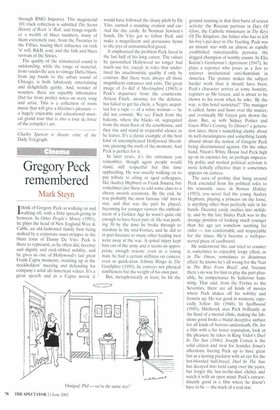Gregory Peck remembered
Mark Steyn
Ithink of Gregory Peck as walking on and walking off, with a little speech-giving in between. In Other People's Money (1991), he plays the head of New England Wire & Cable, an old-fashioned family firm being stalked by a corporate asset-stripper in the blunt form of Danny De Vito. Peck is there to represent, as he often did, decency and dignity and rock-ribbed nobility, and he gives us one of Hollywood's last great Frank Capra moments, standing up at the stockholders' meeting and defending his company's solid all-American values. It's a great speech and in a Capra movie it
would have followed the sleazy pitch by De Vito, earned a standing ovation and carried the day easily. In Norman Jewison's hands, De Vito got to follow Peck and make a magnificent and persuasive hymn to the joys of untrammelled greed.
It emphasised the problem Peck faced in the last half of his long career. The values he personified Hollywood no longer had much use for, except in roles that underlined his anachronistic quality if only by contrast. But there were always all those magnificent entrances and exits. The great image of To Kill A Mockingbird (1963) is Peck's departure from the courtroom. Atticus Finch, attorney for the defence, has failed to get his client, a Negro, acquitted for a rape — of a white woman — he did not commit. We see Finch from the balcony, where the blacks sit, segregated from the main floor of the courthouse, and they rise and stand in respectful silence as he leaves. It's a classic example of the best kind of uncomplicated Hollywood liberalism, piercing the truth of the moment. And Peck is perfect for it.
In later years, it's the entrances you remember, though again people would stand, still respectful but this time applauding. He was usually walking on to pay tribute to ailing or aged colleagues, like Audrey Hepburn or Frank Sinatra, but sometimes just there to add some class to a cheesy awards ceremony. By the end, he was probably the most famous sold' movie star, and that was the part he played, becoming for younger viewers the embodiment of a Golden Age he wasn't quite old enough to have been part of. He was pushing 30 by the time he broke through to stardom in the mid-Forties, and he did so in part because so many other leading men were away at the war. A spinal injury kept him out of the army and it seems an appropriate enough reason: even as a young man, he had a certain stiffness on camera: even as quick-draw Johnny Ringo in The Gunfighter (1950), he conveys not physical nimbleness but the weight of his own past.
But, metaphorically at least, he hit the
ground running in that first burst of screen activity: the Russian partisan in Days Of Glory, the Catholic missionary in The Keys Of The Kingdom, the father who has to kill his boy's pet deer in The Yearling. Peck was an instant star with an almost as rapidly established indestructible persona: the dogged champion of worthy causes. In Elia Kazan's Gentleman's Agreement (1947), he plays a reporter who poses as a Jew to uncover institutional anti-Semitism in America. The picture makes the subject harder work than it should have been. Peck's character arrives at some hostelry, registers as Mr Green, and is about to be shown to his room when he asks, 'By the way, is this hotel restricted?' The manager is called, hems and haws over the matter, and eventually Mr Green gets shown the door. But, as with Sidney Poitier and Guess Who's Coming To Dinner? a generation later, there's something clunky about its well-meaningness and something faintly absurd about the notion of Gregory Peck being discriminated against. On the other hand, Nixon's White House had Peck high up on its enemies list, so perhaps impeccably polite and modest political activism is more lethally effective than it sometimes appears on camera.
The aura of probity that hung around Peck extended from his political roles to his romantic ones: in Roman Holiday (1953), you never feel the young Audrey Hepburn, playing a princess on the loose, is anything other than perfectly safe in his hands. Decency easily ossifies into stolidity, and by the late Sixties Peck was in the strange position of looking much younger than his age yet somehow seeming far older — too comfortable and respectable for the times. He'd become a well-preserved piece of cardboard.
He understood this and tried to counter it, sometimes to enjoyably loopy effect, as in The Omen, sometimes to disastrous effect: he knows he's all wrong for the Nazi in The Boys From Brazil, and, because there's no way for him to play the part plausibly, he compensates by ludicrous hamming. That said, from the Forties to the Seventies, there are all kinds of movies where Peck shakes off his nobility and loosens up. He was good in westerns, especially Yellow Sky (1948). In Spellbound (1945), Hitchcock uses Peck brilliantly as the head of a mental clinic, making the fabulous good looks a bland deceptive surface for all kinds of horrors underneath. Or, for a film with a far lesser reputation, look at the pleasure he takes in King Vidor's Duel In The Sun (1946): Joseph Cotten is the solid citizen and rival for Jennifer Jones's affections, freeing Peck up to have great fun as a leering predator with an eye for the hot-blooded half-breed. Duel In The Sun has decayed into lurid camp over the years, but forget the lust-in-the-dust clichés and watch it with an open mind: Peck's extraordinarily good in a film where he doesn't have to be — the mark of a real star.


































































































 Previous page
Previous page